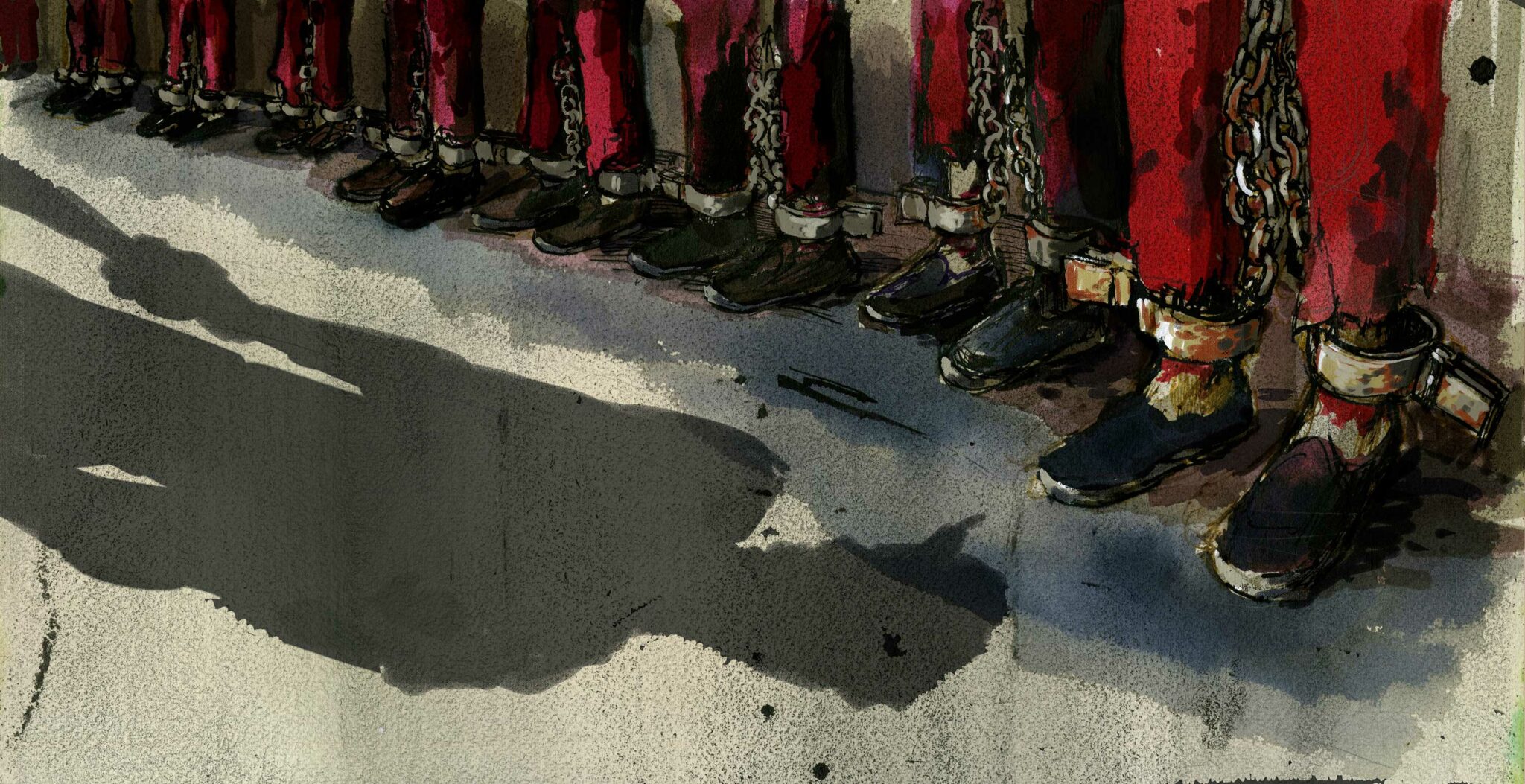Sitting still
Many former detainees reported that during the first few days, weeks, or sometimes months after arriving at the internment camps – before they were required to attend classes – they were forced to do nothing but sit still for nearly the entire day. The only breaks were for meals or to sleep. Nearly all former detainees were forced to sit or kneel for hours on end. [[[Amnesty International interviews.]]] “We were given a small stool. We were made to sit in two lines, with straight backs and hands on knees, all day. If one guy [in the cell] moved then the guards outside would bang on the door with a baton and shout,” Daulet said. [[[Amnesty International interviews.]]]
Many former detainees reported that this position was very painful for their knees and other parts of their body; some developed haemorrhoids and other health problems. [[[Amnesty International interviews.]]] “We had to sit straight… In our room there were old women. Their hands and feet swelled up,” Meryemgül said. [[[Amnesty International interviews.]]] Many reported that inmates were physically punished if they were unwilling or unable to sit straight. [[[Amnesty International interviews.]]] Many reported not being permitted to look anywhere but straight ahead. [[[Amnesty International interviews.]]] Meryemgül said that she was told that if the people monitoring her cell on the cameras noticed anyone moving their lips, guards would deduct from their scores. [[[Amnesty International interviews.]]]
Former detainees often had to sing “red” songs – that is, revolutionary songs that praise the Chinese Communist Party and the People’s Republic of China – or to recite basic Chinese words while they sat still, or in a few instances stood still; others were made to watch Chinese propaganda films. Some literally had to do nothing except sit perfectly still on a small chair or stool in their room. [[[Amnesty International interviews.]]] “I just sat on a stool for three months from morning to 11pm… There was no class, nothing,” Aldiyar recalled. [[[Amnesty International interviews.]]]
Ibrahim, who said he was sent to a camp for visiting Kazakhstan, told Amnesty he was in a camp for several months before guards started taking him to class.
During the days before classes [started] we had to sit on stools [all day]. For 16 hours a day we had to sit on stools with our hands on our knees. We were up at 6am, then sit on stools, then breakfast… Then sit until lunch. Sometimes we were given a book [to learn from]. We could not talk to other people. We had our lunch sitting on the stool. During lunch we could have a nap of an hour or less, sometimes not at all… Then we sit again until it gets dark. [[[Amnesty International interviews.]]]
Ramazan, who also said he was detained for visiting Kazakhstan, told Amnesty that for the first two months after he arrived at the camp, he was forced to sit still in an uncomfortable position for hours each day:
After breakfast we had to sit on our beds with our hands on our knees and a straight back. If we moved, they spoke to us through a loudspeaker [in the room] and said, ‘Don’t move.’ Then, around 11:30 or 12 they brought lunch. Then from 12:30 to 2 we could lie down [on our beds]. Then at 2pm they told us to maintain the seated position. We sat like that until dinner, but they sometimes said through the loudspeaker that we had five minutes to move, lie down, or urinate… Around 7pm we had dinner, and then we watched TV [while sitting]… At 9pm they ordered us to go to bed… We spent [the first] two months without leaving the room, [except] during the day they took us to the toilet, which was outside the room, to [defecate]. They took us two times a day… We never went outside. [[[Amnesty International interviews.]]]
Based on former detainee testimony, it is unclear whether sitting still and doing nothing was a deliberate policy to demoralize or break the will or spirit of newly arrived detainees s or if it was a consequence of the fact that at the start of the government campaign of mass incarceration certain camps were not set up to provide any formalized instruction. It is plausible that it was a deliberate policy in certain camps at certain times but not in others.



